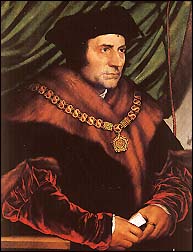The Life of Sir Thomas More (1478-1535)  Thomas More was born in Milk Street, London
on February 7, 1478, son of Sir John More, a prominent judge. ... More
was admitted to Lincoln's Inn
in 1496, and became a barrister in 1501. Yet More did not automatically
follow in his father's footsteps. He was torn between a monastic calling
and a life of civil service. While at Lincoln's Inn, he determined to
become a monk and subjected himself to the discipline of the Carthusians,
living at a nearby monastery and taking part of the monastic life. The
prayer, fasting, and penance habits stayed with him for the rest of his
life. More's desire for monasticism was finally overcome by his sense
of duty to serve his country in the field of politics. He entered Parliament
in 1504, and married for the first time in 1504 or 1505. ... Thomas More was born in Milk Street, London
on February 7, 1478, son of Sir John More, a prominent judge. ... More
was admitted to Lincoln's Inn
in 1496, and became a barrister in 1501. Yet More did not automatically
follow in his father's footsteps. He was torn between a monastic calling
and a life of civil service. While at Lincoln's Inn, he determined to
become a monk and subjected himself to the discipline of the Carthusians,
living at a nearby monastery and taking part of the monastic life. The
prayer, fasting, and penance habits stayed with him for the rest of his
life. More's desire for monasticism was finally overcome by his sense
of duty to serve his country in the field of politics. He entered Parliament
in 1504, and married for the first time in 1504 or 1505. ...In 1510, he was appointed one of the two undersheriffs of London. In this capacity, he gained a reputation for being impartial, and a patron to the poor. In 1511, More's first wife died in childbirth. More was soon married again, to Dame Alice. During the next decade, More attracted the attention of King Henry VIII. In 1515 he accompanied a delegation to Flanders to help clear disputes about the wool trade. [His most famous book,] Utopia [which invented the word for an ideal world, literally meaning "No Place"] opens with a reference to this very delegation. More was also instrumental in quelling a 1517 London uprising against foreigners, portrayed in the play Sir Thomas More, possibly by Shakespeare. ... In 1518 he became a member of the Privy Council, and was knighted in 1521. More helped Henry VIII in writing his Defence of the Seven Sacraments, a repudiation of Luther, and wrote an answer to Luther's reply under a pseudonym. More had garnered Henry's favor, and was made Speaker of the House of Commons in 1523.... As Speaker, More helped establish the parliamentary privilege of free speech. He refused to endorse King Henry VIII's plan to divorce Katherine of Aragón (1527). Nevertheless, after the fall of Thomas Wolsey in 1529, More became Lord Chancellor, the first layman yet to hold the post. While his work in the law courts was exemplary, his fall came quickly. He resigned in 1532, citing ill health, but the reasons was probably ... Henry's stance toward the church. He refused to attend the coronation of Anne Boleyn in June 1533, a matter which did not escape the King's notice. ... In April, 1534, More refused to swear to the Act of Succession and the Oath of Supremacy, and was committed to the Tower of London on April 17. More was found guilty of treason and was beheaded on July 6, 1535. His final words on the scaffold were: "The King's good servant, but God's First." More was ... canonized by the Catholic Church as a saint by Pope Pius XI in 1935.
|